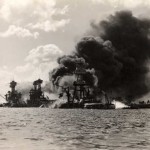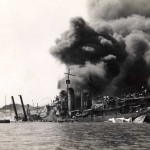 As the 73rd anniversary of the Japanese attack on Pearl Harbor dawns, I have to wonder why it is that the United States always feels that the other side must attack us first, and only then can we attack them. I know this is not always the case, but it seems like that is often the case. We try to be the peacemakers, and going to war is never something that we take lightly. Killing people is a horrible step to take. So, we always give warning after warning before we finally move, and even then it is usually too late to be the first to strike. I understand that the one who strikes first often looks like the bad guy, but it also seems like so often we are given much advance warning that a strike is eminent, and yet we wait…usually until after the attack happened and many people are dead, and the rest of us, while really angry, are too busy picking up the pieces to think about an immediate retaliatory strike.
As the 73rd anniversary of the Japanese attack on Pearl Harbor dawns, I have to wonder why it is that the United States always feels that the other side must attack us first, and only then can we attack them. I know this is not always the case, but it seems like that is often the case. We try to be the peacemakers, and going to war is never something that we take lightly. Killing people is a horrible step to take. So, we always give warning after warning before we finally move, and even then it is usually too late to be the first to strike. I understand that the one who strikes first often looks like the bad guy, but it also seems like so often we are given much advance warning that a strike is eminent, and yet we wait…usually until after the attack happened and many people are dead, and the rest of us, while really angry, are too busy picking up the pieces to think about an immediate retaliatory strike.
That was exactly where the United States found itself on December 7, 1941. We had warned Japan over and over, and with the Hull Note came the final warning. Even the fact that we knew that they would not comply, and we were in essence declaring war on Japan, we trusted them to move slowly…hoping for them to have a change of heart or something. They, on the other hand, acted almost immediately…or at least as immediate as they could back in 1941. They sent their strike force toward Pearl Harbor, while also sending a decoy strike force toward Thailand, in an effort to throw us off. Convinced that Japan was planning an attack on Thailand, President Roosevelt sent Emperor Hirohito a telegram, requesting that “for the sake of humanity,” the emperor intervene “to prevent further death and destruction in the world.” We were trying to be the peacemakers.
After sending the telegram, President Roosevelt was enjoying his stamp collection with his personal advisor, Harry Hopkins, and they were discussing the Japanese refusal to honor the Hull Note. Hopkins suggested that America should strike first, but President Roosevelt insisted that we could not do that. In reality, it was already to late for us to strike first. The Japanese were already on their way to attack Pearl Harbor, and a significant portion of the Pacific Fleet was there, anchored like sitting ducks, waiting for the attack. The ambush would take out 18 U.S. ships. Those destroyed, sunk, or capsized were the Arizona, Virginia, California, Nevada, and West Virginia. More than 180 planes were destroyed on the ground and another 150 were damaged, leaving only 43 planes operational. The American casualties totaled more than 3,400, with more than 2,400 killed…1,000 on the Arizona alone. The Japanese lost fewer than 100 men.
It seems to me that it is so often the side that strikes first…swiftly and with the element of surprise…that fares the best in the end. The side who was unaware, or didn’t heed the warning signs was slaughtered. We have one of the greatest military forces on the face of the earth here in America, so should we really ever be taken by surprise like that? I don’t think we should. I believe that if the strongman gets so sure of his might that he forgets the need to be watchful and wise, then when he least expects it, the strongman is caught unaware, and can be taken…even if his might should have prevented it. The United States has long been that strongman, and yet it seems that because of our hesitation to strike first, we are attacked over and over without warning. Then and only then, it seems, will we attack them in retaliation.
It is a dilemma I suppose, and maybe that was where President Roosevelt was coming from. We are the bad  guys with the world if we attack first, and we are the bad guys with our own nation if we do not attack first. And, to top it off our intelligence isn’t always as reliable as it needs to be, so sometimes, such as on December the 7th, 1941, we are caught off guard, and completely by surprise, when we trusted an enemy to be as honorable as we try to be, and they feel no such obligation to honor. I guess that while we don’t like it when we are attacked without provocation, we must nevertheless, do the honorable thing, and not attack just because we anticipate an attack on us. If we were to do that, we would be no different than the nations we have to go to war with because they have invaded some other nation. Still, it is so hard to always be the nation that does the right thing, when we really don’t trust our enemies…because we know better.
guys with the world if we attack first, and we are the bad guys with our own nation if we do not attack first. And, to top it off our intelligence isn’t always as reliable as it needs to be, so sometimes, such as on December the 7th, 1941, we are caught off guard, and completely by surprise, when we trusted an enemy to be as honorable as we try to be, and they feel no such obligation to honor. I guess that while we don’t like it when we are attacked without provocation, we must nevertheless, do the honorable thing, and not attack just because we anticipate an attack on us. If we were to do that, we would be no different than the nations we have to go to war with because they have invaded some other nation. Still, it is so hard to always be the nation that does the right thing, when we really don’t trust our enemies…because we know better.


5 Responses to Trusting Our Enemies